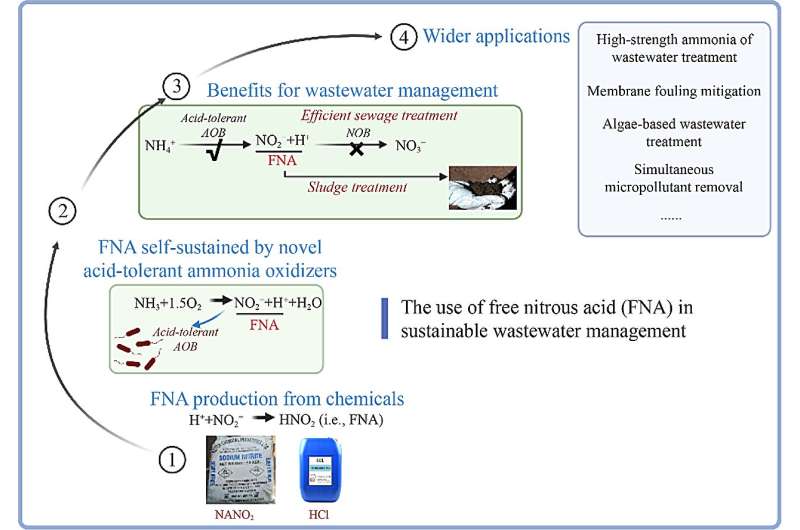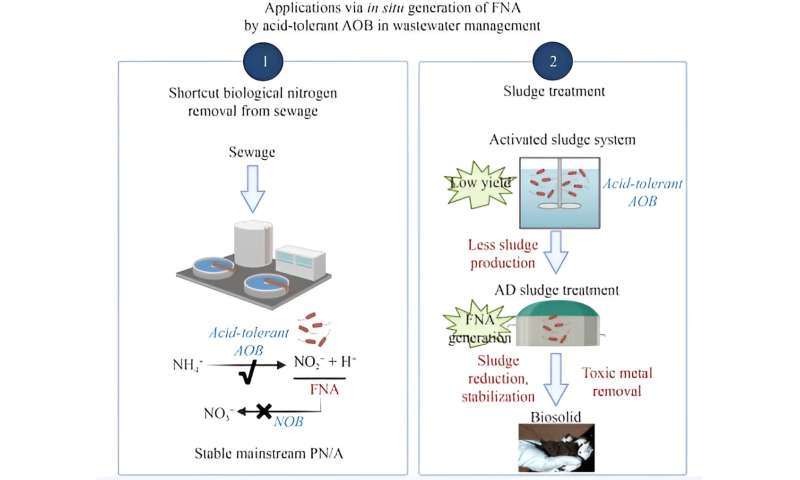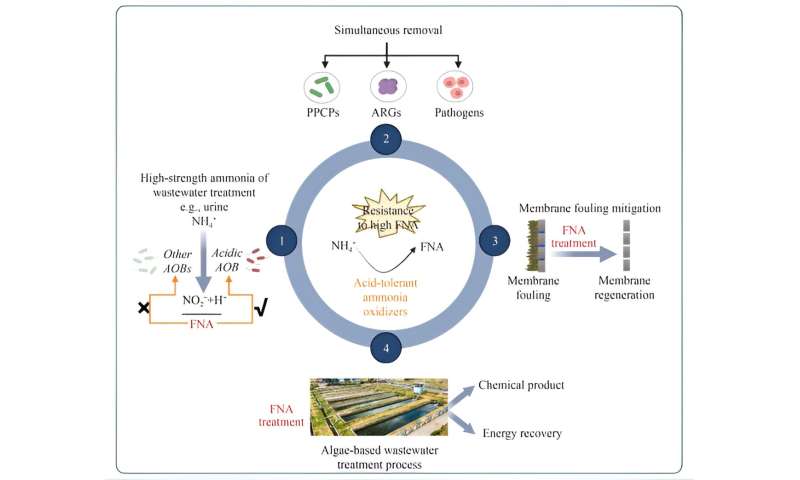
Free nitrous acid (FNA) is known for its capacity to inhibit various microorganisms in wastewater systems, significantly benefiting treatment process management. Initially deemed problematic due to its potential adverse effects on treatment, FNA is now employed to enhance wastewater management by mitigating odors, emissions, and harmful bacteria.
Nonetheless, the traditional production of FNA is expensive, dependent on substantial chemical inputs. Recent advancements strive to optimize and render its production more economical.
A perspective, published in Frontiers of Environmental Science & Engineering on 5 December 2023, introduces a novel approach for sustainable wastewater management. Leveraging the unique properties of FNA, researchers aim to create more energy-efficient and sustainable wastewater systems.
The study introduces an innovative approach in wastewater management by exploring the potential of acid-tolerant ammonia oxidizers (AOB) to produce FNA directly from domestic wastewater. This method utilizes the biocidal effects of FNA, traditionally limited by chemical costs, to improve various wastewater treatment processes.
Researchers have identified acid-tolerant AOBs such as Nitrosospira, Nitrosococcus, and Candidatus Nitrosoglobus, which flourish in acidic conditions that usually inhibit standard AOBs. The resilience of these organisms to strong FNA enables in situ generation of FNA, eliminating the need for external nitrite and acid, thus reducing operational costs and chemical usage.
The application of these acid-tolerant AOBs effectively lowers wastewater pH and functions optimally in acidic conditions, offering a more sustainable and energy-efficient wastewater management system. This innovative approach aims to leverage the natural abilities of these organisms to boost the efficiency and sustainability of wastewater treatment, marking a significant progression in environmental engineering.
-

Potential applications of FNA produced in situ by acid-tolerant AOB to sewage and sludge treatment. Credit: Frontiers of Environmental Science & Engineering (2023). DOI: 10.1007/s11783-024-1786-5
-

Wider applications of FNA produced in situ for sustainable wastewater management. Credit: Frontiers of Environmental Science & Engineering (2023). DOI: 10.1007/s11783-024-1786-5
The researchers say, “This study not only redefines the efficiency and sustainability of wastewater management but also demonstrates the remarkable adaptability and resilience of novel microbiological processes in environmental engineering.”
Implementing acid-tolerant AOB in wastewater systems has demonstrated the potential for energy self-sufficiency and enhanced sustainability. By effectively reducing wastewater pH and operating optimally in acidic conditions, these AOBs can significantly enhance the efficiency and effectiveness of wastewater management without requiring external acids. This approach not only offers broader possibilities for enhancing wastewater management but also signifies a considerable advancement towards environmentally sustainable practices.
More information:
Zhiqiang Zuo et al, New perspectives in free nitrous acid (FNA) uses for sustainable wastewater management, Frontiers of Environmental Science & Engineering (2023). DOI: 10.1007/s11783-024-1786-5
Citation:
Next-generation wastewater solutions: Utilizing acid-resistant microbes for improved treatment efficiency (2024, January 11)
retrieved 11 January 2024
from https://phys.org/news/2024-01-generation-wastewater-solutions-acid-resistant.html
This document is subject to copyright. Apart from any fair dealing for the purpose of private study or research, no
part may be reproduced without the written permission. The content is provided for information purposes only.







